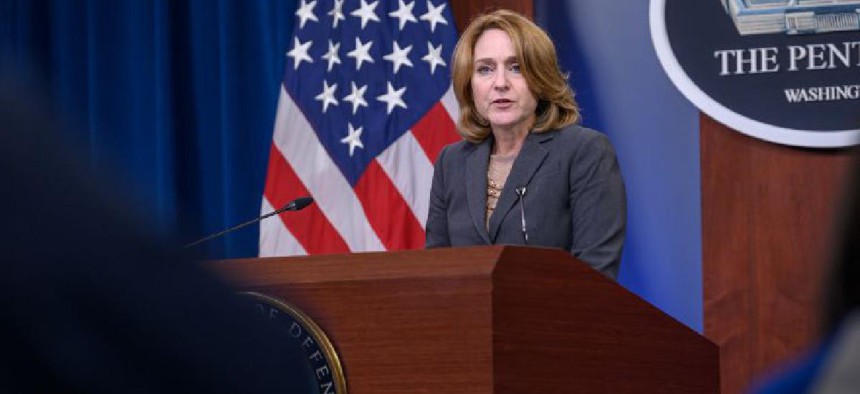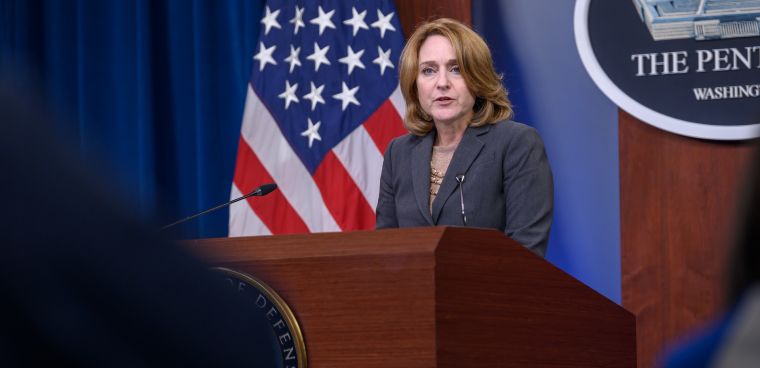Pentagon adds new top AI role

The Pentagon is creating a new position to lead its artificial intelligence efforts across the enterprise.

Deputy Secretary of Defense Kathleen Hicks, shown here at a September 2021 press briefing, announced the creation of a new top AI post at the Pentagon. (DOD photo by U.S. Air Force Staff Sgt. Brittany A. Chase)
The Pentagon is creating a new position to lead its artificial intelligence efforts.
The chief digital and artificial intelligence officer, starting Feb. 1, 2022, will be based in the Office of the Secretary of Defense, reporting to the deputy defense secretary. and oversee three organizations the Defense Department leans on for emerging technology and talent: the Joint Artificial Intelligence Center, the Defense Digital Service, and the chief data officer, according to a Dec. 8 memo.
The new digital and AI officer is expected to reach full operating capacity by June 2022 with an implementation plan in place by January 15, 2022. The office of the chief digital and AI officer will serve as the “successor organization to the JAIC,” according to the memo, and as an “intervening supervisor” for DDS. The chief data officer will continue to report to the defense secretaries through the CIO, but be “operationally aligned” to the new position.
The move is meant to be a “shift in organizational concept” rather than adding another management layer, a senior defense official told reporters Dec. 8. DOD is still in the early stages of fleshing out the position and hasn’t decided whether the position will have a military or civilian lead over the three organizations, the official said. The Pentagon is not yet considering combining the organizations into one.
The Defense Department has been working to integrate AI and data efforts, and the governance that goes with them. The 2019 National Defense Authorization Act called for DOD to designate a senior official to coordinate its AI and machine learning activities, including those across the military services, by developing a strategic plan for AI adoption and transitioning those technologies to be used operationally.
The Defense Innovation Board also previously recommended in 2019 that the deputy secretary of defense create a senior-level committee that would have oversight and execution responsibilities for DOD’s AI strategy and ethics principles.
Most recently, the National Security Commission on AI wrote in its final recommendations earlier this year that DOD “appoint a full-time, senior-level responsible AI lead in each department or agency critical to national security and each branch of the armed services” to drive coordination, training, policies, practices and procurement.
Data, workforce efforts
The announcement comes as the Defense Department is working to shift its approach to data. David Spirk, the Defense Department’s chief data officer, said during a Dec. 7 FCW event, that implementing industry best practices for secure authentication, access, encryption and monitoring, data protection at rest and in use as DOD embraces zero trust, were top priorities in the coming months.
Spirk said the goal is to have operational data teams stood up in the next 90 days with civilian chiefs installed in each one. The goal is to be able to take DOD’s data catalog across the department and automate real-time data sharing with partners and allies over the next year.
On the workforce front, Spirk said there’s an ongoing conversation with the undersecretary of defense for personnel and readiness and the deputy defense secretary’s workforce council on how data expertise and fluency is being crafted into a qualification for military career development.
“How do we talk more about the entire digital workforce...how are we beginning to add not only our physical capabilities but also our technical and data capabilities to that same promotion criteria for the department,” Spirk said, adding that the challenge was named in the May 5 memo announcing DOD’s data decrees.
NEXT STORY: Why good program governance is a key to success



